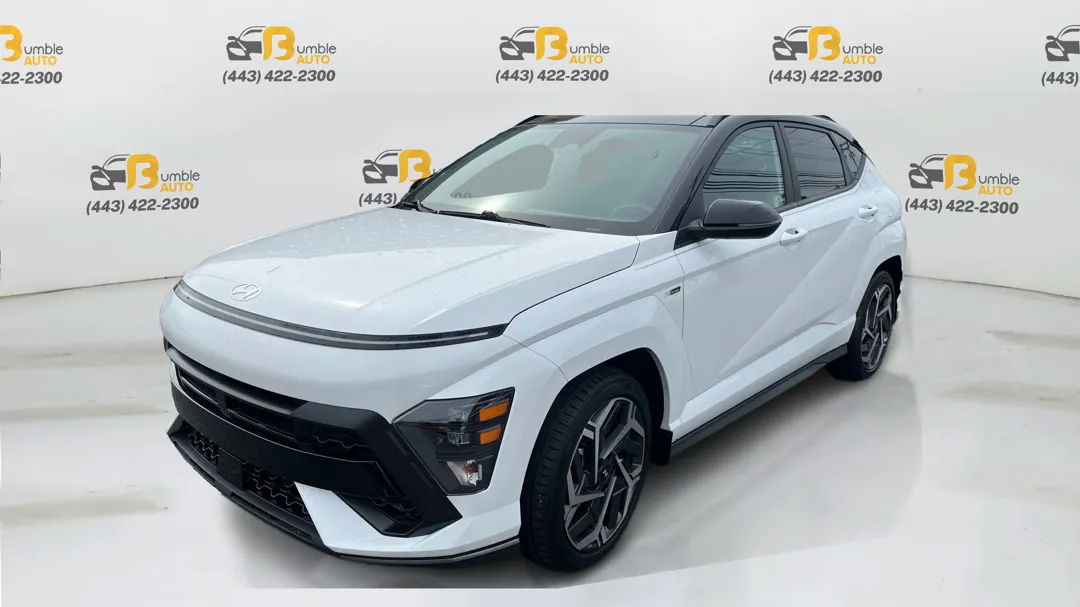Low-Interest Financing on Used Cars in Baltimore: How to Drive Home for Less
Table of Contents
- Understanding Low-Interest Financing for Used Cars
- Benefits of Financing a Used Car
- 1. Cost Savings and Affordability
- 2. Credit-Building Opportunities
- 3. Greater Vehicle Selection and Flexibility
- The Current Used Car Market in Baltimore
- How to Qualify for Low-Interest Financing
- Maintaining a Strong Credit Score
- Demonstrating Income Stability
- Leveraging a Down Payment or Trade-In
- Comparing Lender Offers
- Top Lenders Offering Low-Interest Rates in Baltimore
- Tips for Negotiating Financing Terms
- 1. Getting Pre-Approved Before Shopping
- 2. Looking Beyond the Monthly Payment
- 3. Leveraging Credit, Down Payment, and Trade-In Value
- 4. Reading the Fine Print Carefully
- The Importance of Credit Scores in Car Financing
- Common Mistakes to Avoid When Financing a Used Car
- 1. Not Shopping Around for Financing Options
- 2. Focusing Only on the Monthly Payment
- 3. Extending the Loan Term Beyond the Car’s Value
- 4. Overlooking the Details in the Loan Agreement
- Conclusion: Making Informed Decisions for Affordable Rides
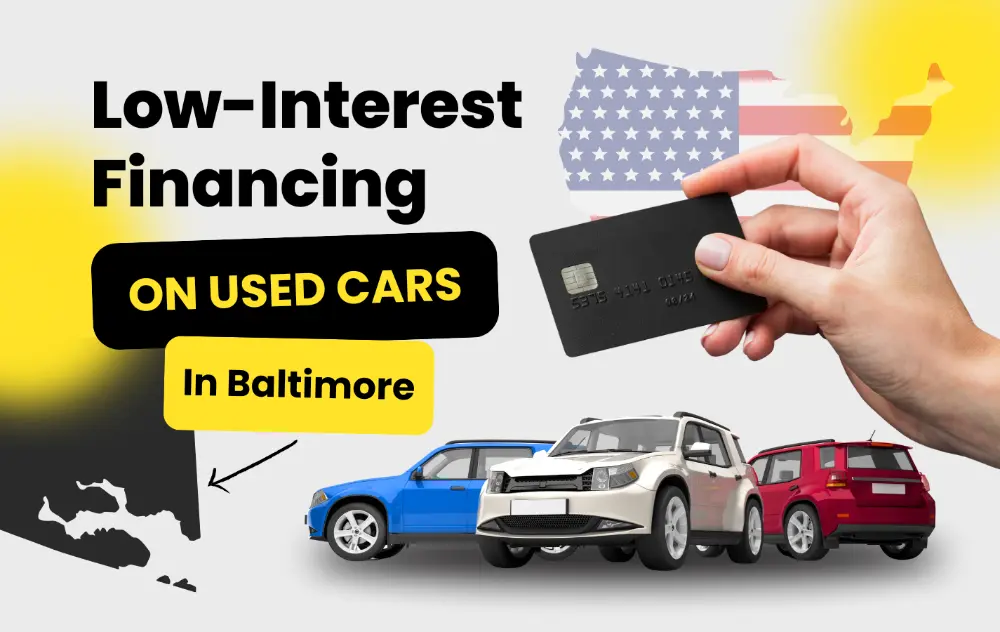
In Baltimore, the dream of owning a reliable used car doesn’t have to break the bank. With the rise of low-interest financing options, getting behind the wheel of your ideal vehicle is more accessible than ever. Whether you're commuting to work, running errands, or exploring the scenic Chesapeake Bay, affordable rides are within your reach. Understanding the ins and outs of financing can save you money and give you peace of mind as you navigate the car-buying process.
This guide will equip you with essential tips and resources to unlock the best deals on used cars and take advantage of low-interest financing offers tailored for your budget. Say goodbye to high monthly payments and hello to a smoother ride—it's time to transform your car-buying journey into a stress-free experience. Get ready to hit the road in Baltimore confidently, knowing you made the smart financial choice for your future.
Understanding Low-Interest Financing for Used Cars
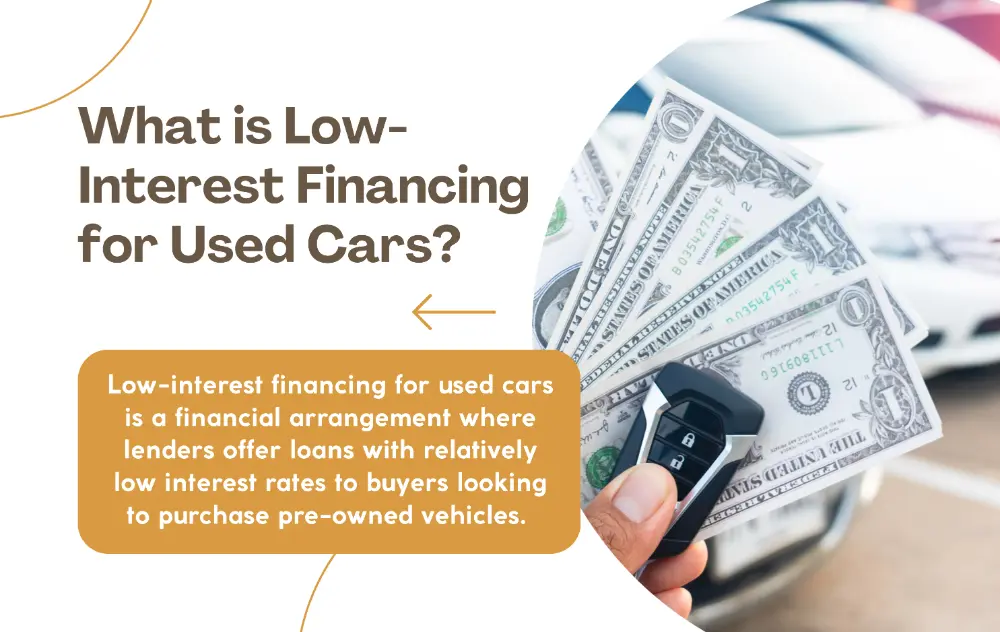
Low-interest financing for used cars is a financial arrangement where lenders offer loans with relatively low interest rates to buyers looking to purchase pre-owned vehicles. This type of financing can significantly reduce the overall cost of the car by lowering the amount of interest paid over the life of the loan. In simple terms, it allows you to borrow money at a lower cost compared to traditional high-interest loans, making it a more affordable option for many buyers. Understanding how low-interest financing works is crucial for anyone looking to save money on their next car purchase.
When you secure low-interest financing, the lender assesses your creditworthiness and financial history to determine the interest rate you qualify for. Factors such as your credit score, income, and debt-to-income ratio all play a role in this determination. Lenders typically offer the best rates to borrowers with excellent credit scores, but even those with fair or good credit can still find competitive rates. It's important to shop around and compare offers from different lenders to ensure you're getting the best possible deal.
Financing a used car through a low-interest loan can also provide more flexibility in your budget. By spreading out the cost of the vehicle over several years, you can manage your monthly payments more effectively. This can free up funds for other expenses or allow you to purchase a higher-quality car than you might have been able to afford with cash. To understand how rates vary by location, read the car financing definition and basics to get clear on key loan terms and APR details. Additionally, many lenders offer various loan terms, allowing you to choose a repayment period that best fits your financial situation.
Benefits of Financing a Used Car
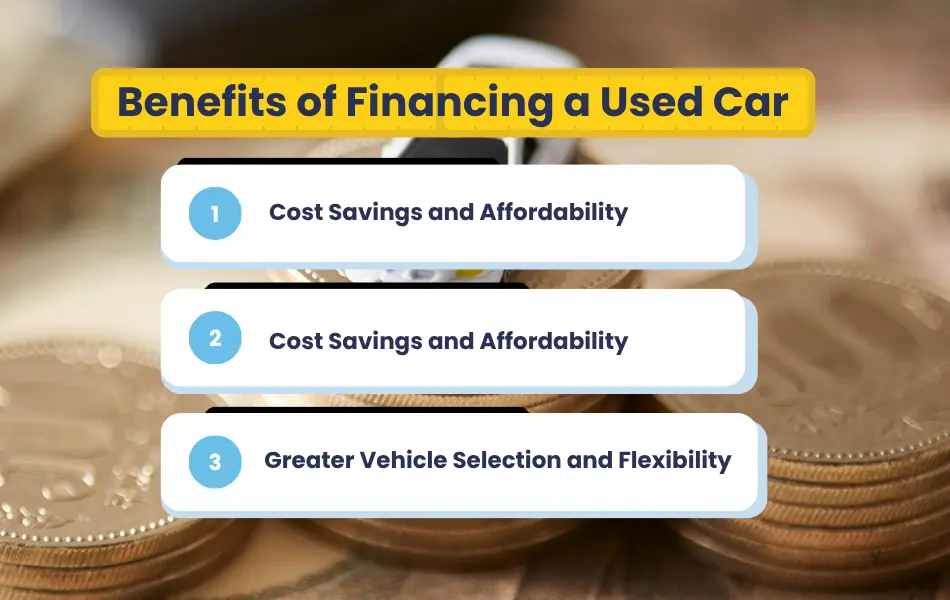
Financing a used car can be a smart choice for many buyers, offering advantages that go beyond simply lowering the upfront cost. From affordability to credit-building opportunities, this option provides both financial and practical benefits that make car ownership more accessible. For additional insight, explore what are the advantages of buying a used car to learn why used vehicles make smart financial sense.
1. Cost Savings and Affordability
One of the biggest benefits of financing a used car is the potential for significant cost savings. Since used cars are priced lower than new models, you get more value for your money. When paired with favorable financing terms, such as low-interest rates, the overall cost of ownership becomes even more affordable. This makes financing particularly appealing for budget-conscious buyers who want to maximize their investment.
2. Credit-Building Opportunities
Financing a used car also helps you build or improve your credit score. By making consistent, on-time payments, you establish a positive payment history that credit bureaus recognize. Over time, this can strengthen your credit profile, making it easier to qualify for future loans like mortgages or personal credit. For buyers with limited or less-than-perfect credit, financing a used car can serve as a stepping stone toward better financial health.
3. Greater Vehicle Selection and Flexibility
Another advantage of financing a used car is the flexibility it offers in choosing a vehicle. The used car market provides a wide variety of makes, models, and price ranges, giving you more options to find the right fit for your needs. Whether you want a specific feature, style, or budget-friendly option, financing can make it easier to afford the vehicle you want. Many used cars also come with extended warranties or certified pre-owned programs, offering additional protection and peace of mind.
By combining cost savings, credit-building potential, and flexibility in vehicle selection, financing a used car can be a practical and financially beneficial decision.
The Current Used Car Market in Baltimore

The used car market in Baltimore is vibrant and diverse, offering a wide array of options for buyers. With numerous dealerships, private sellers, and online marketplaces, finding the right vehicle at the right price is more accessible than ever. According to used car prices in 2025, market trends in Maryland and Baltimore continue to favor smart buyers who compare financing options carefully. The city's thriving economy and growing population have contributed to an increased demand for reliable transportation, making used cars a popular choice for many residents.
One trend in the Baltimore used car market is the rising popularity of certified pre-owned (CPO) vehicles. These cars have undergone rigorous inspections and come with extended warranties from the manufacturer, providing added assurance of quality and reliability. CPO vehicles often include additional benefits such as roadside assistance and special financing offers, making them an attractive option for buyers seeking peace of mind and value.
Another notable aspect of the Baltimore used car market is the availability of various financing options tailored to different financial situations. Many local lenders and credit unions offer competitive rates and flexible terms, allowing buyers to find financing that suits their budget. Additionally, there are numerous resources and tools available to help buyers compare prices, check vehicle histories, and calculate potential loan payments, making the car-buying process more transparent and informed.
How to Qualify for Low-Interest Financing
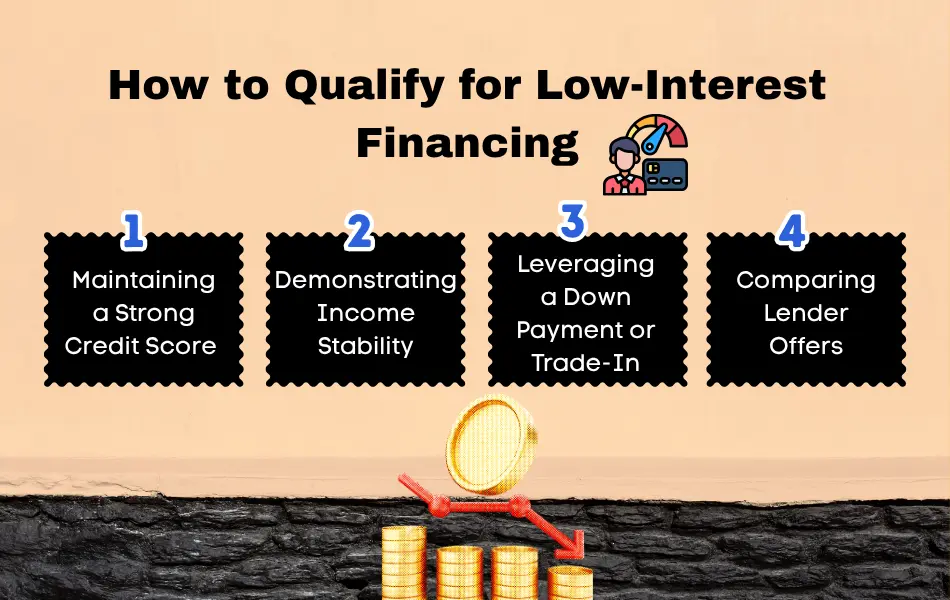
Securing low-interest financing for a used car isn’t just about luck—it requires preparation, strong financial habits, and knowing what lenders look for. By focusing on credit health, income stability, and down payment readiness, you can increase your chances of qualifying for favorable loan terms.
Maintaining a Strong Credit Score
Your credit score plays one of the biggest roles in determining the interest rate you’ll receive. Lenders view a high score as a sign of reliability, which usually results in lower rates. To improve or maintain your score, prioritize paying bills on time, paying down existing debts, and checking your credit report regularly for mistakes. Even small improvements in your credit score can make a noticeable difference in the financing options available to you.
Demonstrating Income Stability
Lenders also evaluate your income and employment history to ensure you have the means to repay the loan. A stable job and steady income signal reliability, increasing your chances of approval. In addition, a low debt-to-income ratio strengthens your application by showing that you are not overextended financially. Providing recent pay stubs or tax documents helps reassure lenders of your financial stability.
Leveraging a Down Payment or Trade-In
Having a down payment ready can make qualifying for low-interest financing much easier. By reducing the amount you need to borrow, you lower your monthly payments and overall interest costs. A larger down payment also shows lenders that you are financially responsible and committed to the purchase. Consider reading about the factors influencing car trade-in value to understand how your trade-in can strengthen your financing application. If saving up isn’t feasible, trading in your current vehicle can serve as a practical alternative.
Comparing Lender Offers
Not all financing options are the same, so shopping around is key. By comparing offers from banks, credit unions, and dealerships, you can find the most competitive rates and terms. Taking the time to research multiple lenders ensures you don’t miss out on the best deal for your situation.
By focusing on these steps—credit, income, down payment, and lender comparisons—you can position yourself to qualify for low-interest financing and make your used car purchase more affordable in the long run.
Top Lenders Offering Low-Interest Rates in Baltimore

Several institutions in Baltimore provide competitive low-interest auto loans:
- Local Credit Unions: Baltimore County Employees Federal Credit Union and First Financial Federal Credit Union are known for low rates, personalized service, and flexible loan terms.
- National Banks: Bank of America, Wells Fargo, and other major banks with Baltimore branches offer various loan options and pre-approval tools to help buyers make informed decisions.
- Online Lenders: Platforms like LightStream and Capital One Auto Navigator provide convenience, competitive rates, and easy online applications for Baltimore residents seeking to compare offers from home.
Exploring both local and national lenders ensures you don’t miss out on the best possible financing.
Tips for Negotiating Financing Terms

Negotiating financing terms is one of the most effective ways to reduce the cost of a used car loan. With the right strategies, you can secure better interest rates, avoid unnecessary fees, and save money over the life of the loan. Preparation and confidence are key when approaching lenders or dealerships. Before visiting a dealer, learn the dos and don’ts when buying a used car to avoid common negotiation mistakes.
1. Getting Pre-Approved Before Shopping
A smart first step is to secure pre-approval from a bank, credit union, or online lender before you visit the dealership. Pre-approval not only gives you a clear picture of your budget but also strengthens your bargaining power, as you’ll already know the rates and terms you qualify for. This allows you to compare lender offers and approach dealerships with confidence.
2. Looking Beyond the Monthly Payment
Dealerships often emphasize low monthly payments, but this can be misleading. While a smaller payment may look appealing, it often comes with extended loan terms and higher total interest costs. Instead, focus your negotiation on securing a lower interest rate and a shorter loan duration. This strategy keeps your total loan cost under control while still maintaining manageable payments.
3. Leveraging Credit, Down Payment, and Trade-In Value
Your credit score, down payment, and trade-in value are powerful tools in negotiation. A strong credit profile and larger down payment reduce the lender’s risk, which can translate into more favorable loan terms. Similarly, trading in your old vehicle can help lower the principal balance, giving you additional room to negotiate a better interest rate.
4. Reading the Fine Print Carefully
Never rush through the loan agreement. Take the time to review all the terms and conditions, and pay close attention to potential hidden fees, prepayment penalties, or added costs that could increase your loan balance. If something is unclear, ask questions until you’re completely satisfied with the explanation. Being proactive and assertive ensures you won’t be caught off guard later.
By preparing ahead, staying focused on the total cost, and carefully reviewing the details, you can negotiate financing terms that protect your budget and give you the best possible value for your used car loan.
The Importance of Credit Scores in Car Financing

Credit scores play a crucial role in car financing, as they are one of the primary factors lenders use to determine your creditworthiness and the interest rate you qualify for. A higher credit score indicates a lower risk to lenders, which can result in more favorable loan terms, including lower interest rates. If you have less-than-perfect credit, check out that what is bad credit car dealership to explore financing options designed for your situation.Conversely, a lower credit score may lead to higher interest rates and less favorable terms, making it more expensive to finance a used car.
Maintaining a good credit score requires responsible financial behavior, such as paying bills on time, keeping credit card balances low, and managing debt effectively. Regularly monitoring your credit report for errors and disputing any inaccuracies can also help ensure that your score accurately reflects your credit history. Additionally, avoiding taking on new debt before applying for a car loan can improve your chances of securing better financing terms.
For those with lower credit scores, there are still options available to obtain financing, but it may require more effort and research. Some lenders specialize in subprime auto loans, which are designed for borrowers with less-than-perfect credit. These loans often come with higher interest rates, but they can provide an opportunity to improve your credit score by making consistent, on-time payments. It's important to carefully review the terms of any subprime loan and explore all available options before making a decision.
Common Mistakes to Avoid When Financing a Used Car
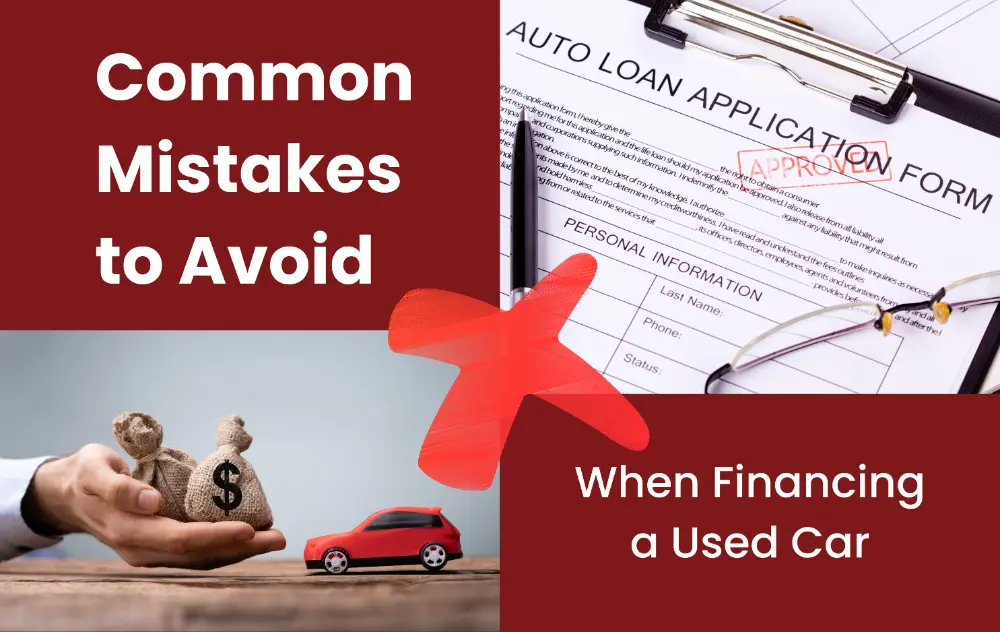
Financing a used car can be a smart move, but certain mistakes can turn an affordable purchase into an expensive burden. For more helpful insights, don’t miss 10 tips for successful used car purchase to make confident financing decisions. By knowing what to avoid, you can make better financial decisions and protect yourself from long-term costs.
1. Not Shopping Around for Financing Options
One of the most frequent mistakes buyers make is accepting the first loan offer they receive. Without comparing rates and terms from multiple lenders, you may end up paying more than necessary. Banks, credit unions, and online lenders often provide different interest rates and conditions, so taking the time to gather several quotes ensures you secure the most competitive financing available.
2. Focusing Only on the Monthly Payment
Another common misstep is concentrating solely on the monthly payment amount. While a lower payment might seem attractive, it often comes at the cost of a longer loan term and significantly more interest paid over time. Instead of focusing only on affordability month to month, evaluate the loan’s full cost—including interest rate, term length, and total repayment amount—to ensure you’re getting the best overall deal.
3. Extending the Loan Term Beyond the Car’s Value
Stretching out a loan term can sometimes reduce your monthly payments, but it may also lead to negative equity. This means you could end up owing more on your loan than your car is worth as it depreciates. To avoid this trap, make sure your financing plan aligns with the vehicle’s expected lifespan and value.
4. Overlooking the Details in the Loan Agreement
Failing to thoroughly review the loan agreement is another mistake that can create financial headaches. Important details such as hidden fees, prepayment penalties, or additional charges may be buried in the fine print. Taking the time to read the contract carefully and asking for clarification on unclear terms will protect you from unpleasant surprises later on.
By steering clear of these common pitfalls, you’ll be better positioned to finance your used car responsibly, saving money while gaining peace of mind.
Conclusion: Making Informed Decisions for Affordable Rides
Navigating the world of used car financing in Baltimore doesn't have to be daunting. By understanding the key elements of low-interest financing, recognizing the benefits of financing a used car, and staying informed about the current market trends, you can make a smart and affordable car purchase. Taking the time to qualify for the best rates, negotiating favorable terms, and avoiding common mistakes will further ensure that you secure a deal that aligns with your financial goals.
Exploring various lenders and alternative financing options can also provide additional opportunities to find the best rates and terms for your situation. For more car-buying advice and financing guides, visit your trusted used car financing in Ellicott City and explore local inventory today. Whether you choose a traditional auto loan, dealer financing, or an alternative option, being thorough in your research and understanding the details of your loan agreement is crucial. Remember, a well-informed decision can lead to significant savings and a more enjoyable car ownership experience.
Ultimately, the goal is to drive away in a reliable used car that meets your needs and fits your budget. With the right approach and resources, you can unlock affordable rides and enjoy the freedom and convenience of owning a car in Baltimore. So, take the wheel with confidence, knowing you've made a financially sound choice for your future. Happy driving!





